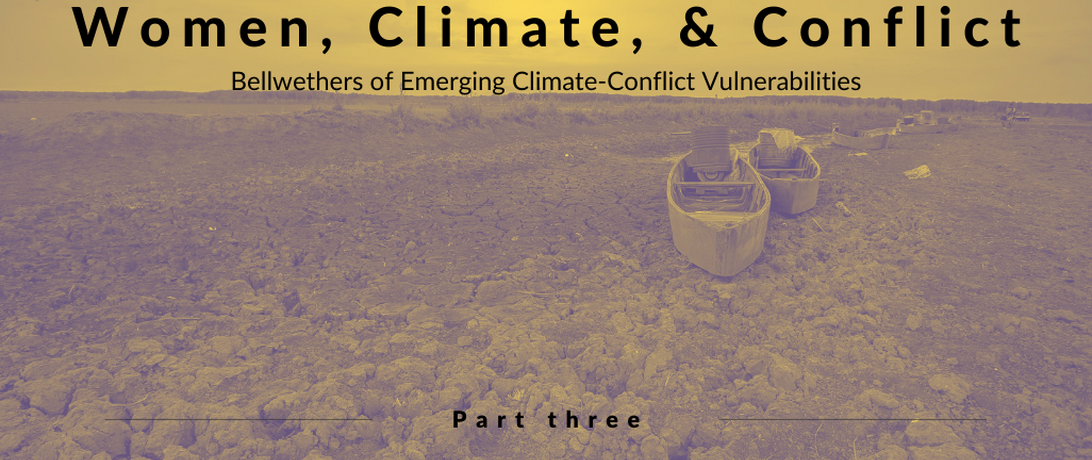
Part three of our guest blog series exploring the nexus of gender, conflict and climate change.
As a guest blog, the views expressed in this publication do not necessarily reflect the views of Our Secure Future or One Earth Future.
As we saw in the previous article, women who live at the nexus of both climate and conflict can be uniquely vulnerable to the dual threats. While the U.S. security sector has increased its knowledge of and plans to address the intersection of climate and conflict, rarely has gender been part of the picture. This is a wasted opportunity. When women are consulted, policies and strategies are more effective and longer-lasting. Women could and should serve as bellwethers on emerging climate-related conflicts.
Tapping into Women’s Specialized Climate-Conflict Knowledge
There are many points at which decisionmakers should engage with women on their experiences on the frontline of climate change. Women are often the gatherers of fuel, small-scale farmers, and water keepers. And, in many indigenous communities, women and girls are keepers of substantial environmental wisdom because of their responsibilities for collecting plants for food and medicine, preparing fish, and more. Women are therefore uniquely qualified to report on how climate change is affecting their communities. This knowledge is crucial for policymakers as they determine how to reduce the fragility of their communities in the face of climate change, and how to avoid climate-related conflict.
Moreover, women’s societal roles often force them to adapt to changing weather and environmental conditions to survive. Resultantly, women’s specialized knowledge is a source for how to increase climate resilience. For instance, in Nepal, a women’s group in Mugu and Mangri villages provided previously undocumented information on landslide activity in the region and vital information on the state of drinking water facilities. This information was used to help build a new drinking water facility and a canal that powers a watermill to replace one destroyed by a landslide. In Indonesia, policymakers have recognized women’s specialized knowledge of water quality and management in their Policy Paper on Gender Mainstreaming in Climate Change Adaptation and are working toward ensuring that women are consulted on water management planning, implementation, and monitoring and evaluation.
Unfortunately, due to patriarchal structures in many states, women are often excluded from decisionmaking systems, educational opportunities, and disaster response efforts, weakening the effectiveness of each of these spheres. For instance, women are often the most keenly aware of family and community dynamics that improve resilience against climate-conflict threats, such as the movements of refugees, smuggling, and shifts in gender relations and roles, all of which may indicate rises in violence and emerging conflict. By using a gendered lens to develop climate adaptation plans, often the policies, programs, and projects that result are more equitable – and therefore more effective.
There are direct opportunities to tap into women’s specialized climate knowledge that benefit the security community. For example, agricultural surveys on food scarcity in Burundi revealed a mismatch between availability of fertilizer and the price of food. However, when women farmers were interviewed, they reported that the problem arose due to unofficial taxes levied by soldiers patrolling roads. If used strategically, this kind of information can stem food price increases and potentially avoid conflict.
When included, women also contribute to intelligence gathering for risk assessment purposes. In fact, the U.S. State Department has found that when women’s traditional knowledge is combined with technology - such as remote sensing or seafloor mapping - plans and programs for transportation, natural resource management, navigation, and extreme weather forecasting are improved. Tapping into specialized gender-based knowledge by consulting with women about changing environmental and community conditions can improve local resilience, prevent migration, and create more effective humanitarian responses.
On the other hand, excluding women means having only half of available data, the consequences of which can include shortsighted climate and conflict risk assessments and crippled strategic planning - dangerous oversights that may result in wasted opportunities, increased levels of violence, and greater loss of life.
Thankfully, though there are signs that the women-climate-conflict nexus is garnering more attention in Washington. A recent Congressional Report on Women, Peace and Security makes several references to climate change. And, the Women, Peace and Security (WPS) agenda, which includes references to climate change, has been codified into U.S. law through the Women, Peace and Security Act of 2017 (P.L. 115-68).
The WPS agenda came from decades of feminist activism across the globe, particularly from women in the Global South who were experiencing conflict firsthand. We must continue to center the voices of women who are on the frontlines of disasters, and ensure that their experiences and knowledge are integrated into policy. If women were in policymaking leadership roles globally, even more could be done to make human communities worldwide less fragile to climate-conflict impacts. It’s to that subject that we turn next.
Article Details
Published
Written by
Topic
Program
Content Type
News